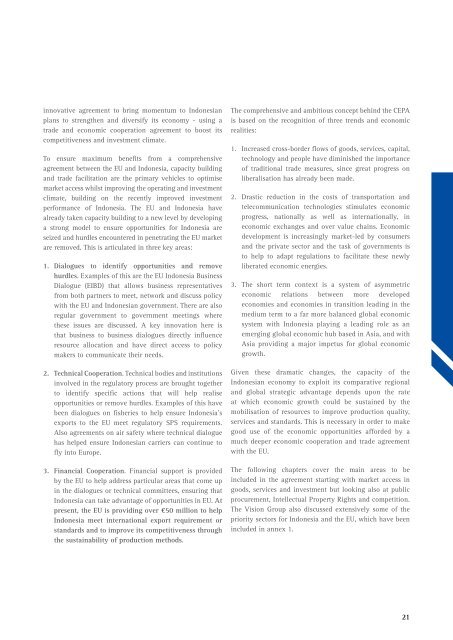Vision Group Report: Invigorating the Indonesia-EU Partnership
Vision Group Report: Invigorating the Indonesia-EU Partnership
Vision Group Report: Invigorating the Indonesia-EU Partnership
Create successful ePaper yourself
Turn your PDF publications into a flip-book with our unique Google optimized e-Paper software.
innovative agreement to bring momentum to <strong>Indonesia</strong>n<br />
plans to streng<strong>the</strong>n and diversify its economy - using a<br />
trade and economic cooperation agreement to boost its<br />
competitiveness and investment climate.<br />
To ensure maximum benefits from a comprehensive<br />
agreement between <strong>the</strong> <strong>EU</strong> and <strong>Indonesia</strong>, capacity building<br />
and trade facilitation are <strong>the</strong> primary vehicles to optimise<br />
market access whilst improving <strong>the</strong> operating and investment<br />
climate, building on <strong>the</strong> recently improved investment<br />
performance of <strong>Indonesia</strong>. The <strong>EU</strong> and <strong>Indonesia</strong> have<br />
already taken capacity building to a new level by developing<br />
a strong model to ensure opportunities for <strong>Indonesia</strong> are<br />
seized and hurdles encountered in penetrating <strong>the</strong> <strong>EU</strong> market<br />
are removed. This is articulated in three key areas:<br />
1. Dialogues to identify opportunities and remove<br />
hurdles. Examples of this are <strong>the</strong> <strong>EU</strong> <strong>Indonesia</strong> Business<br />
Dialogue (EIBD) that allows business representatives<br />
from both partners to meet, network and discuss policy<br />
with <strong>the</strong> <strong>EU</strong> and <strong>Indonesia</strong>n government. There are also<br />
regular government to government meetings where<br />
<strong>the</strong>se issues are discussed. A key innovation here is<br />
that business to business dialogues directly influence<br />
resource allocation and have direct access to policy<br />
makers to communicate <strong>the</strong>ir needs.<br />
2. Technical Cooperation. Technical bodies and institutions<br />
involved in <strong>the</strong> regulatory process are brought toge<strong>the</strong>r<br />
to identify specific actions that will help realise<br />
opportunities or remove hurdles. Examples of this have<br />
been dialogues on fisheries to help ensure <strong>Indonesia</strong>’s<br />
exports to <strong>the</strong> <strong>EU</strong> meet regulatory SPS requirements.<br />
Also agreements on air safety where technical dialogue<br />
has helped ensure <strong>Indonesia</strong>n carriers can continue to<br />
fly into Europe.<br />
3. Financial Cooperation. Financial support is provided<br />
by <strong>the</strong> <strong>EU</strong> to help address particular areas that come up<br />
in <strong>the</strong> dialogues or technical committees, ensuring that<br />
<strong>Indonesia</strong> can take advantage of opportunities in <strong>EU</strong>. At<br />
present, <strong>the</strong> <strong>EU</strong> is providing over €50 million to help<br />
<strong>Indonesia</strong> meet international export requirement or<br />
standards and to improve its competitiveness through<br />
<strong>the</strong> sustainability of production methods.<br />
The comprehensive and ambitious concept behind <strong>the</strong> CEPA<br />
is based on <strong>the</strong> recognition of three trends and economic<br />
realities:<br />
1. Increased cross-border flows of goods, services, capital,<br />
technology and people have diminished <strong>the</strong> importance<br />
of traditional trade measures, since great progress on<br />
liberalisation has already been made.<br />
2. Drastic reduction in <strong>the</strong> costs of transportation and<br />
telecommunication technologies stimulates economic<br />
progress, nationally as well as internationally, in<br />
economic exchanges and over value chains. Economic<br />
development is increasingly market-led by consumers<br />
and <strong>the</strong> private sector and <strong>the</strong> task of governments is<br />
to help to adapt regulations to facilitate <strong>the</strong>se newly<br />
liberated economic energies.<br />
3. The short term context is a system of asymmetric<br />
economic relations between more developed<br />
economies and economies in transition leading in <strong>the</strong><br />
medium term to a far more balanced global economic<br />
system with <strong>Indonesia</strong> playing a leading role as an<br />
emerging global economic hub based in Asia, and with<br />
Asia providing a major impetus for global economic<br />
growth.<br />
Given <strong>the</strong>se dramatic changes, <strong>the</strong> capacity of <strong>the</strong><br />
<strong>Indonesia</strong>n economy to exploit its comparative regional<br />
and global strategic advantage depends upon <strong>the</strong> rate<br />
at which economic growth could be sustained by <strong>the</strong><br />
mobilisation of resources to improve production quality,<br />
services and standards. This is necessary in order to make<br />
good use of <strong>the</strong> economic opportunities afforded by a<br />
much deeper economic cooperation and trade agreement<br />
with <strong>the</strong> <strong>EU</strong>.<br />
The following chapters cover <strong>the</strong> main areas to be<br />
included in <strong>the</strong> agreement starting with market access in<br />
goods, services and investment but looking also at public<br />
procurement, Intellectual Property Rights and competition.<br />
The <strong>Vision</strong> <strong>Group</strong> also discussed extensively some of <strong>the</strong><br />
priority sectors for <strong>Indonesia</strong> and <strong>the</strong> <strong>EU</strong>, which have been<br />
included in annex 1.<br />
21

















